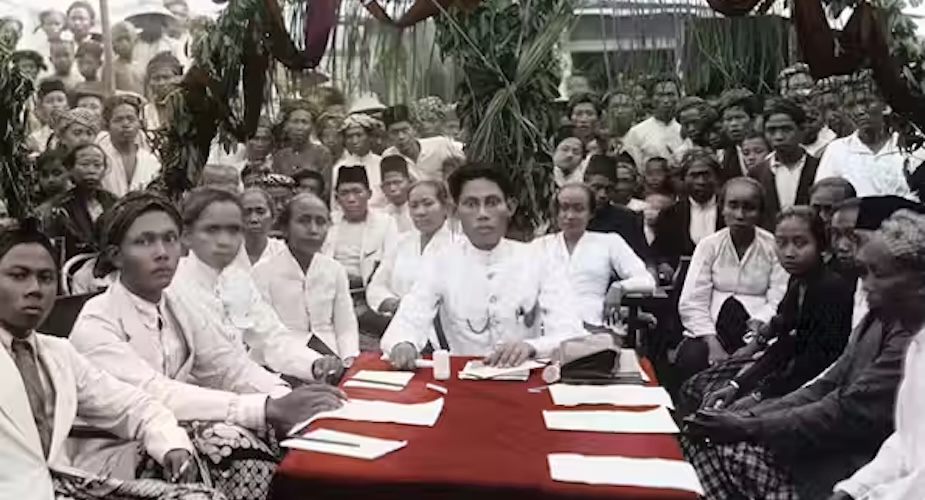Indonesia’s decentralisation law is causing headaches in Dusun Belido
Andrew Steele
The treeless landscape is dotted with wooden shacks, and recently sown crops break through the dry, cracked earth. There is no electricity or even a well for water. But for the 600 villagers trying to resuscitate this clear-felled land, Dusun Belido (Belido Hamlet) in South Sumatra is home — at least for now.
Villagers here are embroiled in a land dispute. Provincial authorities want them removed from this land, which they first settled in 2002. They argue that the villagers are encroaching on conservation forest lands. However, district level officials disagree, saying they can stay and cultivate the land between Jambi and Palembang in South Sumatra Province.
Control over land remains a sensitive, and unresolved, issue throughout Indonesia. Jurisdictional disputes such as this have become increasingly common since the country’s Regional Autonomy Law took effect in January 2001. Analysts maintain this is due in part to the law’s failure to stipulate clearly which level of government has authority over the land. A July 2003 Asia Foundation report concluded that the law puts local governments in a difficult position, and that the provincial governments tend to usurp local government authority. Under the Regional Autonomy Law control of forest resources was allocated to the districts. Jakarta-elites saw this as an affront to their business interests, and another law was issued just six months later, undermining the districts’ licensing authority.
Despite the new law, district officials continue to feel they have control over the land. For example, in Dusun Belido elders received a letter from the district level Forestry Department in 2002 that gave them clearance to stay. ‘We got permission to use land that did not have forest on it,’ explains Hadis, a 52 year-old South Sumatran. But provincial officials from the Conservation Department in Palembang have disputed the legitimacy of the letter and continue to call for their expulsion. ‘The law is not clear,’ says Abdul Wahib Situmorang, an activist from the environmental NGO Walhi, which is helping the villagers lobby provincial officials.
Accountability still lacking
Indonesia’s initial foray into decentralisation occurred in 1957 under the country’s first president, Sukarno. However, regional autonomy was rolled back when Sukarno declared martial law in an attempt to stamp out regional rebellions in Sulawesi and Sumatra. For over three decades, following Suharto’s ascension to power in 1966, authority rested with the central government in Jakarta.
During Suharto’s reign, regional leaders were both appointed and chosen through elections scripted by Jakarta. But since the 1999 Regional Autonomy Law was passed, local legislatures have greater powers to elect district heads (mayors and bupati), to question the executive and to make district laws (perda). While election results are now free of outside influence, critics say the combination of a weak provincial party system and the absence of direct elections help local elites to seize control over regional politics, and block the development of real democratic accountability.
This could be changed with direct elections for governors, mayors and district heads, as politicians would be more apt to listen to their constituents if they were reliant on their votes for obtaining office. This could assist Indonesians in regional areas such as Dusun Belido to get district and provincial assemblies to take their needs and desires into account.
For now, Dusun Belido is not formally recognised as a desa (village), and as a result does not have a village head, or a Village Representative Council (Badan Perwakilan Desa). Activist Muhamad Nur, 64, and the head of a nearby village are working to help the villagers of Dusun Belido. This is change for the better, because the previous village head offered no assistance.
Corruption continues
The Regional Autonomy Law was pushed through parliament in just nine months. Analysts say this poor planning has led to insufficient monitoring and is partly to blame for Indonesia’s continued corruption.
Decentralisation has allowed regional leaders more direct influence over the activities of local government. This structural change has created new opportunities for gaining experience, but also new avenues for corruption. ‘Decentralisation leads to more people being able to lay their hands on state coffers, and the resources of the country,’ says Dr Bernhard May, who has been advising the Indonesian government on decentralisation issues since the 1980s. ‘Clearly the number of [local people] who can share in the corruption pie has increased.’
P. Agung Pambudhi, the executive director of Regional Autonomy Watch (KPPOD), agrees that corruption in the provinces stems in part from local politicians’ access to the budget. According to Agung, KPPOD has identified numerous examples of local governments doctoring their books — including filing receipts for training sessions that never occurred and trips abroad allegedly aimed at local capacity building.
In assessing efforts by local governments to increase transparency and accountability, Agung says the current arrangement of decentralisation blurs the control of local resources and impedes development and investment efforts in the provinces. ‘Some businesses get authorisation and licenses to invest from Jakarta,’ says Agung, ‘but then the license is rejected at the district level.’
Provincial authorities have also been guilty of corrupt practices. According to villagers, Conservation Department officials from South Sumatra Province approached elders in Dusun Belido and demanded a tax be paid in rice for each hectare of land used. Muhamad Nur says the provincial officials are simply trying to intimidate villagers for their own gain. He says, ‘the Conservation Department really just wants a big bribe from them so that they can stay.’
Attempts by Jakarta to supervise regions such as South Sumatra have been ineffective, with such efforts at times falling on deaf ears. ‘Provinces have ignored ministerial decrees,’ laments Agung. He says KPPOD has catalogued 3500 new taxation and service regulations implemented by regional governments since 2001. An estimated 30 per cent of the regulations contain ‘principle and substantial problems’.
Jakarta wants revisions
Policy advisors, academics and NGO workers in Jakarta agree that decentralisation is an integral part of the country’s future. But they argue that revision of the Regional Autonomy Law is imperative, to ensure that the specific roles of government are clear. This is also because the all-powerful Ministry of Home Affairs does not want to share administrative authority with provinces and districts.
According to the Jakarta view, greater participation and accountability will not be established without revisions to the Regional Autonomy Law. For the central government, the current law has failed to define the obligatory functions of each level of government. This leaves areas like Dusun Belido with no recourse for action over its land claims.
Jakarta-based economist Dr Hadi Soesastro and others maintain that revisions to the law need to start with the establishment of direct elections for provincial and local posts, which will increase participation and potentially produce more accountable politicians. ‘Political representatives in the regions have no guidance and are very susceptible to corruption,’ explains Hadi. ‘The political structure needs to be reorganised to produce a more accountable system. [This can be changed] through the direct election of local leaders.’
`The biggest change that is needed is more clarity in the constitution,’ explains Dr May. ‘What is regional authority all about? How should the interactions between the central government and the regional governments be organised in a unitary state?’
Monitoring from Jakarta is inadequate, and corruption is flourishing (not just in the regions), but analysts remain upbeat about the impact of regional autonomy in Indonesia. ‘It gives us encouragement in the end,’ says Hadi Soesastro. ‘It may in fact create openness in which the people who were very powerless will in a sense rise up.’ Dr May, too, feels that the legislation is already bearing fruit, citing Indonesia’s strengthened civil society and its role in facilitating accountability and participation as evidence of this. He says, ‘Through decentralisation civil society has become much more active in local governance. There are hundreds [of NGOs] that are scrutinising local government actions and have been successful in causing governments to change direction.’
According to the Asia Foundation, participation has increased since the introduction of the legislation three years ago, but ‘citizen participation remains low, limited to observer or spectator roles.’ Local NGOs are seeking to change this, but progress is slow.
Something has to give
Meanwhile the residents of Dusun Belido gather to discuss their dilemma, and decide what they need from the government. Despite not being able to elect local representatives (because they don’t have formal village status), the villagers have taken steps to increase their participation in local politics. This year they formed their own advocacy group, Forum Masyarakat Simpang Tonka (Simpang Tonka Citizens’ Forum), in an attempt to preserve their access to the disputed land.
Continued ambiguity over jurisdictional control of state land doesn’t make it easy for them to find a solution. ‘If the government helps us, thank God,’ says Hadis. ‘All we really need is an opportunity because we will work hard. People here could be prosperous, if the government could help with seeds and fertilisers, cattle and training.’
Hadis and his community just need to figure out where to place this request: Jakarta, Palembang or the local district head. For now, this remains a difficult question to answer.
Andrew Steele (apsteele73@yahoo.com) is a graduate student at Ohio University in Journalism and International Affairs.











